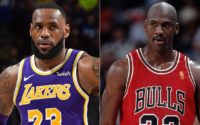LeBron James Speaks Publicly For The First Time About Opening The School
While he did try to keep a low profile, LeBron James at some point had to come forward and address both his decision to join the Lakers, as well as the opening of his foundation’s I Promise School in Akron, his move to Hollywood and what it’s like watching his son, LeBron James Jr., follow in his footsteps as a young basketball star.
Here is a transcript, edited for length, from the interview.
RN: We’re sitting here in this school you’re opening in Akron, Ohio. You’ve talked about how much Ohio means to you, how much Cleveland, the Cavaliers have meant to you. How tough a call was it?
LJ: It’s kind of a bittersweet moment right now. Sitting here in my school that I’m opening, around these kids, around this community. And then at the same time, making the switch to the other coast, being a part of the Lakers now. It’s always a tough decision when you leave home or you leave an organization that you’ve been with for multiple years. It was tough to leave the first time. When I left Miami, leaving Cleveland once again, definitely tough. But you know, it’s a decision that was best for me and my family. I think both sides feel great and appreciative of the moments and the time that we have spent together.
RN: So we’re sitting here in this school. This is a co-production between your foundation and the Akron Public School District. A public school …
LJ: Public school.
RN: … for at-risk kids. You’re a guy who has won three NBA titles, four MVPs, and yet you will tell anyone who listens that opening this school today is a greater moment than any of those — and I got tape of you in Game 7 in the NBA Finals. Do you mean it?
LJ: I do. I do mean it. I can sit here and be at a loss for words, which I am now. This is my first time here, walking these hallways and seeing, when I was driving here, just the streets that I walked, some of the stores are still up when I was growing up. It’s a moment I’ll never forget, and hopefully the kids, starting with the 240 kids that we have going in here right now starting today, will never forget it, either.
RN: So much of the features of this school were built around your experience and what you would have wanted or what you would have needed when you were that age. So tell me what it was like to be one of those kids. What did you walk around thinking was possible or what was not possible?
LJ: You didn’t know what was possible for you because you kind of always paid attention to the statistics. Growing up in the inner city, the numbers are always stacked up against you. So you didn’t really know what was possible. I think what happened for me was that I got some mentors and little league coaches and some teachers that I kind of started to believe in. And they started to make my dreams feel like they could actually become a reality.
We’re starting with 240 kids, 120 in third grade and 120 in fourth grade. And I believe that’s where it all kind of starts. And that’s where it started for me. You know, fourth grade I missed 80 days of school. That following year I met the Walker family, and they had a support system. I met some little league coaches playing basketball and football and the following year I didn’t miss one day of school. So I feel like this is the point where we can kind of get into the minds of the kids and let them know that we’re here for them. And I think that’s what kids ultimately want, they just want someone to feel like someone cares about them. And that’s what we’re trying to do here.
RN: When people hear that number, I’m not sure they can feel what that was like. First of all, I have to say that 80-plus days of school — the school year only has about 180 days. So that’s one thing. But that was the year that you and your mom didn’t have a permanent home. You were moving from place to place, you had people helping you out, with a place to sleep, with food. What was that actually like for a kid?
LJ: It was challenging. It was mentally challenging. Sometimes you think about a kid being in the third grade at that age — being 8, 7 years old or in the fourth grade — having responsibility. Or having stress. No kid at 8 and 9 should have stress. And I was one of those kids. So I know exactly what these kids today are going through. I was going to a school on the other side of town, but I was living with a family on the complete opposite side of town. So there was no way that I could even get to the school to even participate. You know, we didn’t have a car, the city bus didn’t come to where I was living. But any time I would show up to school, it was weird, the teachers would always tell my mom that when he shows up, he’s one of the best students that we have. We just hope that he can show up more. And we just couldn’t do it at that point in time. So I know exactly what a lot of these kids are going through.
RN: You have said the line a lot, “Hey, I could have been a statistic.” And you weren’t because, as you said, you’re good at basketball. That people who were around basketball took an interest in you and supported you. What do you think would have happened to you if you had been a few inches shorter?
LJ: You know what the thing is, a lot of people hear the story of, well, you were good at basketball so a lot of people helped you. I didn’t start playing basketball until the fifth grade. I didn’t play organized basketball until the fifth grade. I started getting help, you know, third and fourth grade. Going into fifth grade, that’s when I met the Walker family and that was the first year that I played little league football. And I played little league football before basketball. And then the mentorship started there, from Frank Walker to Bruce Kelker, a guy by the name of Willie Earl. And then I met coach Dru Joyce, and the list goes on and on. If it wasn’t for meeting these families and meeting these people, then I would never have even gotten to a point where you guys know who I am today as the basketball player, but more importantly, the guy who’s giving back to his community. I just give a lot of credit and a lot of thanks to my mentorship and to the people who were just there for me.
RN: Most kids don’t have all those families, all those coaches, looking out for them. You decided pretty early that you were going to look out for the kids from Akron, even the ones who weren’t good at sports. And your foundation has done tutoring and support and all kinds of shoulder programming. But how did you get to a school? Because we are sitting in an actual school.
LJ: Yeah, how did we get to a school? That’s what we’re all trying to figure out. You were around when it was just a 5-mile bike ride. And I think it just shows growth, from me as a basketball player as well. From the bike-a-thon to who I am as a basketball player, and it shows the growth throughout our foundation and how we can continue to get better and better and better and kind of just, like, not having a ceiling. I don’t have a ceiling to how much I can improve my game, and we as a foundation don’t have a ceiling on how much we can improve our community, to a point where we have a school. We literally have a school. It’s not a charter school, it’s not a private school, it’s a real-life school in my hometown. And this is pretty cool.
RN: It’s crazy.
LJ: Yeah, it is. Absolutely.
RN: As I look around here, one thing that caught my eye just beyond all the academic stuff is that kids will go here for a longer school year and also longer school days. They’re here until 5 o’clock, partly just so they’re in this supported system and not out in the world as much. The other thing was food. That if a kid is hungry, it’s hard to learn, so you guys are giving these kids breakfast, lunch and a snack. How important is that?
LJ: I think first of all, fueling the body keeps the mind sharp. I remember when I was a kid, my attention span — I mean, you can have me for a little bit, but you have to keep me engaged. I think obviously fueling these kids and giving them food and breakfast and lunch and a snack — but just keeping them here under our support, keeping them here under our guidance, giving them objectives and criteria that they can match and not feel stressed and feel like they’re family. That’s what we want to create. We want to create an environment of family and not like a workplace. Sometimes you can get tired. If you look at it like work, you kind of get tired of it. We want to create an environment of family, where you want to always be around your family no matter the good and the bad, you always want to be around that support system. So that’s what we’re creating here.
RN: Earlier this year you were instructed to “shut up and dribble.” If you had listened to that, we would not be sitting in this school that 300 kids are getting the benefit of. But I want to backtrack because those comments came because you were critical of the president. And I wanted to know why, while you do things like this, it’s also important for you to use your voice to stand up for kids like that — even as high as criticizing the president of the United States?
LJ: Well, for me, I have a voice. I have a platform, and I have so many kids and — not only kids but also adults that look for guidance and look for someone to lead them at a time when they feel like their voice isn’t powerful. And when you see something that’s unjust and you see something that’s wrong and you see something that’s trying to divide us as a race or as a country, then I feel like my voice can be heard and speak volumes. Especially coming from the point of sports. I live in sports. Without sports, we all wouldn’t be here. I wouldn’t be talking to you, Rach. You wouldn’t be interviewing me. You know, sports, it stops race. Every race comes together to fight for one common goal, and that’s to win and to have fun and to have camaraderie and things like that. And for someone or a body or parties to try to divide us by using our platform of sport — sport has given me everything I could ever ask for — I couldn’t let that happen. By using my voice and letting the youth know and the people that need the guidance know that I care for them and that I’ll be their voice, it’s passionate for me because, like I said: Sports is just the ultimate to bring people together. That’s what I’m here for.
RN: Can we expect you to be as active going up to the next election like you were in the last one?
LJ: I’m here. I already got my suit, my glasses.
RN: We’ve had athletes run for office. This is sort of a public policy thing you’re doing right here at the school.
LJ: It is, but I may stick to coaching for a little bit — AAU. Two tournaments, two national championships, so I’m feeling really good about my situation.
You can read the full transcript here:



